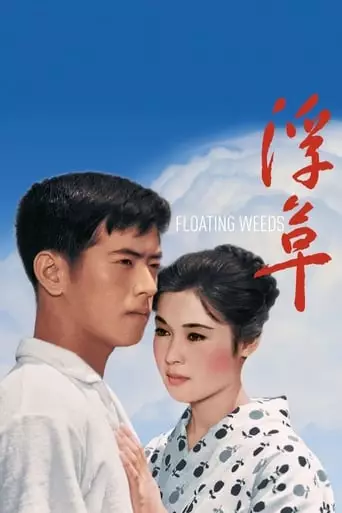
Floating Weeds (1959) Watch Online Free
When a theater troupe’s master visits his old flame, he unintentionally sets off a chain of unexpected events with devastating consequences.
Floating Weeds (1959), directed by Yasujirō Ozu, is a poignant exploration of family dynamics, personal identity, and the transient nature of life. The film follows Komajuro (Ganjiro Nakamura), the leader of a traveling kabuki troupe, as they arrive in a seaside town during the summer. Komajuro’s troupe is struggling, performing to half-empty houses, reflecting the decline of traditional theater in post-war Japan.
In this town, Komajuro reconnects with his former lover, Oyoshi (Haruko Sugimura), who runs a small eatery. They have a son, Kiyoshi (Hiroshi Kawaguchi), who believes Komajuro is his uncle. Komajuro’s current mistress, Sumiko (Machiko Kyo), becomes jealous upon learning of his past relationship and confronts Oyoshi. This confrontation leads to a series of events that unravel the family’s secrets and test their relationships.
As the story progresses, the troupe’s financial difficulties worsen, and personal conflicts intensify. Komajuro’s desire to maintain his personal and professional life as he wishes leads to misunderstandings and emotional turmoil. The film culminates in a bittersweet resolution, highlighting the complexities of love, responsibility, and the passage of time.
Floating Weeds is considered a masterpiece of Japanese cinema and a quintessential work of director Yasujirō Ozu. Its influence extends beyond Japanese cinema, impacting filmmakers worldwide with its subtle storytelling and deep emotional resonance. The film’s exploration of universal themes such as family, sacrifice, and societal expectations continues to resonate with audiences and critics alike.
Critically, Floating Weeds has been lauded for its understated elegance and emotional depth. Roger Ebert, in his review, noted that the film tells a story that becomes sadder the more you think about it, highlighting its enduring emotional impact.
After watching Floating Weeds, you will likely experience a profound sense of reflection and introspection. The film’s exploration of familial relationships and societal expectations may prompt you to consider your own family dynamics and the cultural norms that shape them. The subtle and nuanced storytelling will leave you with a sense of emotional depth and bittersweetness.
The film’s exploration of the transient nature of life and relationships may evoke a feeling of melancholy. The characters’ struggles with personal identity, love, and their responsibilities will likely resonate deeply, especially if you’ve ever faced similar challenges in your own life. The idea of fleeting moments and the impermanence of human connections will linger with you long after the film ends.
Moreover, Floating Weeds offers a delicate portrayal of the complexities of family, particularly the father-son relationship. The emotional weight of the father’s secret and his eventual attempt to reconcile with his son may stir feelings of empathy and sadness. The bittersweet resolution, where the characters come to terms with their past and the consequences of their actions, will leave you reflecting on the choices that shape our lives.
The film’s visual style, with its carefully composed shots and the stillness of the scenes, will evoke a sense of quiet contemplation. Ozu’s ability to convey so much emotion through minimalism will make you appreciate the subtle beauty of everyday moments. The lack of overt melodrama allows the emotions to resonate in a more profound and understated way.
In the end, after watching Floating Weeds, you may feel a sense of emotional fulfillment mixed with a touch of sadness. The film’s meditative pace and exploration of human relationships will encourage you to reflect on your own connections with others, the passage of time, and the ways in which we navigate our lives in a world that is constantly changing. It’s a film that leaves a lasting impression, encouraging you to consider the complexities of life, love, and family, while also appreciating the fleeting beauty of the present moment.
